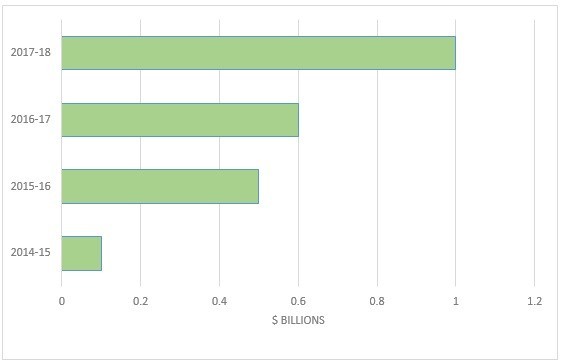Expected extra revenue from indexation of fuel excise (source: Budget 2014/15 Building Australia’s Infrastructure)
There’s plenty the Greens are doing right, but there are also some instances where they’ve lost their way. The promotion of Richard Di Natale to leader offers an opportunity for the Greens at national and state level to restore the focus on integrity crucial to its purpose and its long-run appeal.
Here are a few transport issues relevant to the concerns of the Urbanist — and discussed in greater depth previously in these pages — where the new leader could get the Greens to do much better.
Fuel excise indexation
The first is the party’s grievous mistake in opposing restoration of fuel excise indexation. It’s bizarre that a party with green credentials favours a real reduction in the price of petrol.
Di Natale should note that:
- Indexing the fuel excise to the CPI is not a new tax and nor is it an increase in tax; all it does is maintain the real value of the existing tax.
- The fuel excise is good for the environment; it acts like a de facto carbon tax. In the absence of indexation, this “carbon tax” has fallen in real terms every year since John Howard abolished indexation in 2001.
- Indexation generates much-needed revenue that governments into the future can apply to progressive programs; an estimated $2.2 billion over the four years from 2014-15 to 2018-19.
- The excise will weaken over time due to more fuel-efficient cars; this is not the time to continue allowing the rate to fall in real terms.
- Petrol prices are currently relatively low and are likely to stay that way; it’s a good time to move (and the government has, in any event, already increased the excise slightly via a temporary short-term administrative fix).
- The government has backed off insisting the additional revenue be hypothecated to roads (not that it was ever a real proposition; it was political trickery).
- The equity effects relate to the tax as a whole (currently 39 cents per litre), not to indexation. Incomes also increase at or above CPI.
- Fuel taxes are already very low in Australia compared to most other countries.
- The Grattan Institute says the poorest 20% of households could be compensated for indexation of the fuel excise if just 8% of the additional revenue raised were returned to them through the tax-transfer system.
- Back in 2006, the Greens said John Howard’s abolition of fuel excise indexation was a mistake. At the time, the party called for restoration of indexation to provide revenue for a Climate Disaster Fund.
Di Natale should look to restore the Greens’ credentials by supporting fuel excise indexation without conditions and by looking for ways to maintain this source of revenue over time. It’s harder for governments to implement progressive programs when revenue is throttled. I think the excise should be increased — and now’s the time to do it — but support for indexation would be a start.
East coast high-speed rail
Di Natale should also take the opportunity to guide his party toward taking a more mature approach to policy than the Greens’ current dog-whistle support for east coast high-speed rail (HSR).
He should consider the implications of the findings of the former federal government’s $20 million study of east coast HSR:
- It would divert over $100 billion of public funds (six times more than Rudd’s Building the Education Revolution program) from other worthwhile purposes like health, education, social housing, urban public transport, and programs that actually really do address climate change.
- It offers modest environmental benefits. Externalities only account for 3% of the claimed benefits from HSR; the rest is primarily private benefits accruing as travel-time savings for business and regional leisure travellers.
- It would add very little to the nation’s capability; it would replace one form of public transport (privately funded planes) with another (publicly funded trains).
As I noted here, east coast HSR should not be part of a progressive agenda in Australia. It would be an extraordinarily expensive and inefficient way of marginally reducing carbon emissions; it would be corporate welfare, rural pork-barrelling and greenwashing.
There are far better and more transformative ways that an extraordinary sum like $100 billion could be spent on infrastructure, e.g. improving public transport within major cities, replacing coal-fired power generation with renewable energy; constructing social housing.
Integrity
Finally, the new leader should also seek to put an end to the sort of flagrant politicking that’s been creeping into the party at state and national level, at least in the area of transport. Claims like Adam Bandt’s that the HSR plan would create 200,000 jobs are outlandish (even Labor’s own Anthony Albanese only claimed 10,000!) and typical of the cynical “big party” politics the Greens ostensibly oppose.
Another instance is the Victorian Greens’ claim at the 2010 state election that the government could build 10 new rail lines, 12 new tram lines and heaps more for a mere $13 billion. Given the estimated cost of the nine-kilometre Melbourne Metro alone is around $10 billion, that’s easily the most egregious claim I’ve seen in the last five years of observing urban policy; it makes even the Napthine government’s shenanigans over the East West Link look small time.









Crikey is committed to hosting lively discussions. Help us keep the conversation useful, interesting and welcoming. We aim to publish comments quickly in the interest of promoting robust conversation, but we’re a small team and we deploy filters to protect against legal risk. Occasionally your comment may be held up while we review, but we’re working as fast as we can to keep the conversation rolling.
The Crikey comment section is members-only content. Please subscribe to leave a comment.
The Crikey comment section is members-only content. Please login to leave a comment.